Critical Review: The Role of Vitamins in Dementia Prevention
VerifiedAdded on 2020/01/28
|65
|23116
|317
Report
AI Summary
This report presents a systematic review investigating the role of vitamins in preventing dementia. It begins with an acknowledgment and abstract summarizing the research, followed by a table of contents outlining the report's structure. The introduction defines dementia, its causes, and the importance of preventative measures, highlighting the role of vitamin deficiencies as a risk factor. The rational section explains the issue of dementia, its impact on patients and healthcare, and the need for research. The dissertation's overview discusses various causes of dementia, including Alzheimer's disease and vascular diseases, and emphasizes the importance of vitamins B12 and D. The aim and objectives section clarifies the research's goals, including identifying key vitamins and their link to dementia prevention, and recommending strategies. The research question is framed using the PICO framework. Chapter 1 provides a background review, explaining the literature search strategy and database choices. The methodology chapter outlines the systematic review process, including search terms, inclusion/exclusion criteria, quality assessment, and ethical considerations. The findings and results chapter presents data extraction, synthesis, and thematic analysis. The discussion chapter integrates findings with existing research, addresses knowledge gaps, and considers communication strategies. Chapter 5 discusses the implications for practice, recommendations for future research, and reflections on the review process. The report concludes with a summary of findings and recommendations. The appendices include CASP analysis.
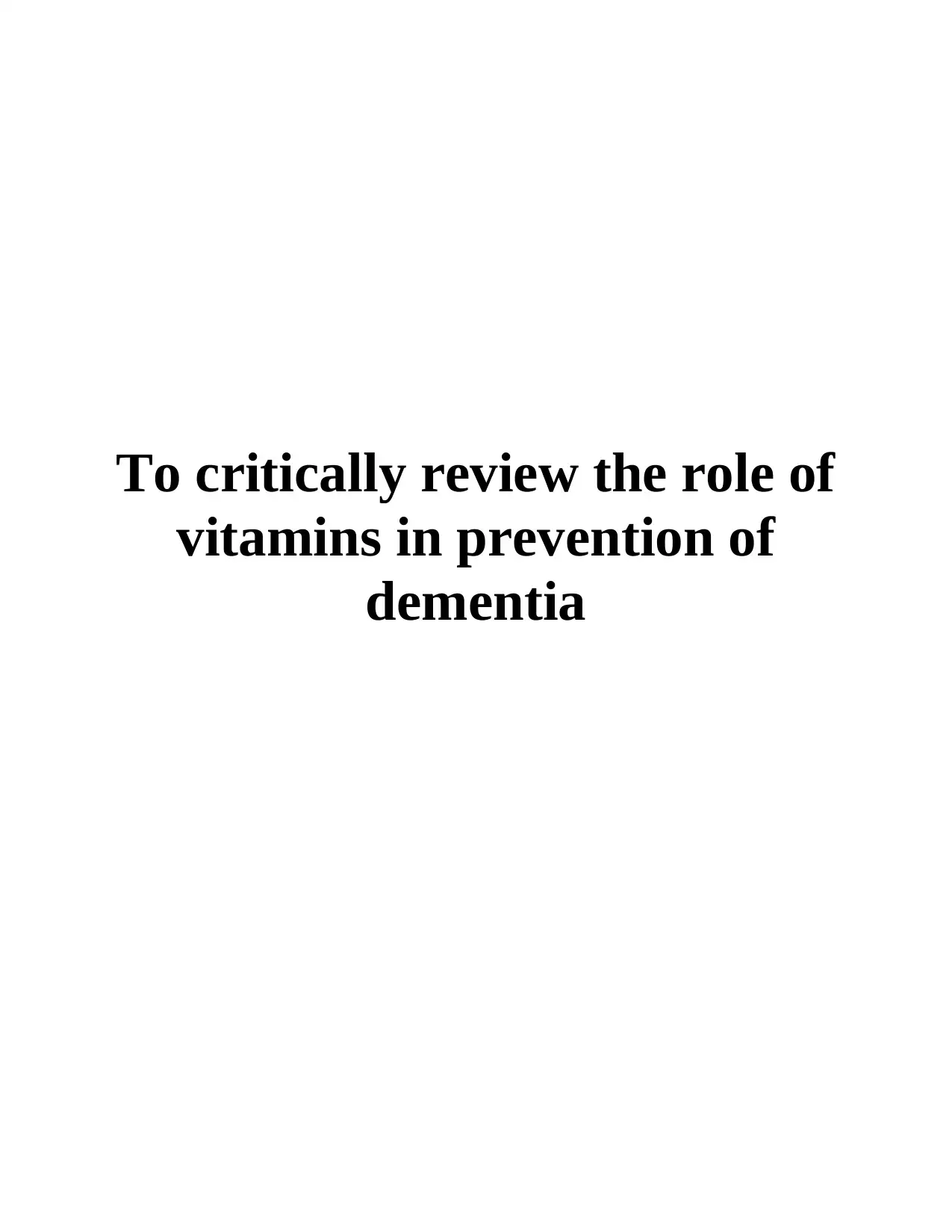
To critically review the role of
vitamins in prevention of
dementia
vitamins in prevention of
dementia
Paraphrase This Document
Need a fresh take? Get an instant paraphrase of this document with our AI Paraphraser

ACKNOWLEDGEMENT
I am so grateful to all those persons who have given me support, guidance as well as much
needed motivation so as to complete the current research study. Firstly, I owe my thanks to mentor
who gave me chance to undertake this dissertation. Furthermore, I am thankful to my team
members, family and friends who helped me in all possible accords. This led to successful
completion of dissertation and achievement of relevant results.
I am so grateful to all those persons who have given me support, guidance as well as much
needed motivation so as to complete the current research study. Firstly, I owe my thanks to mentor
who gave me chance to undertake this dissertation. Furthermore, I am thankful to my team
members, family and friends who helped me in all possible accords. This led to successful
completion of dissertation and achievement of relevant results.
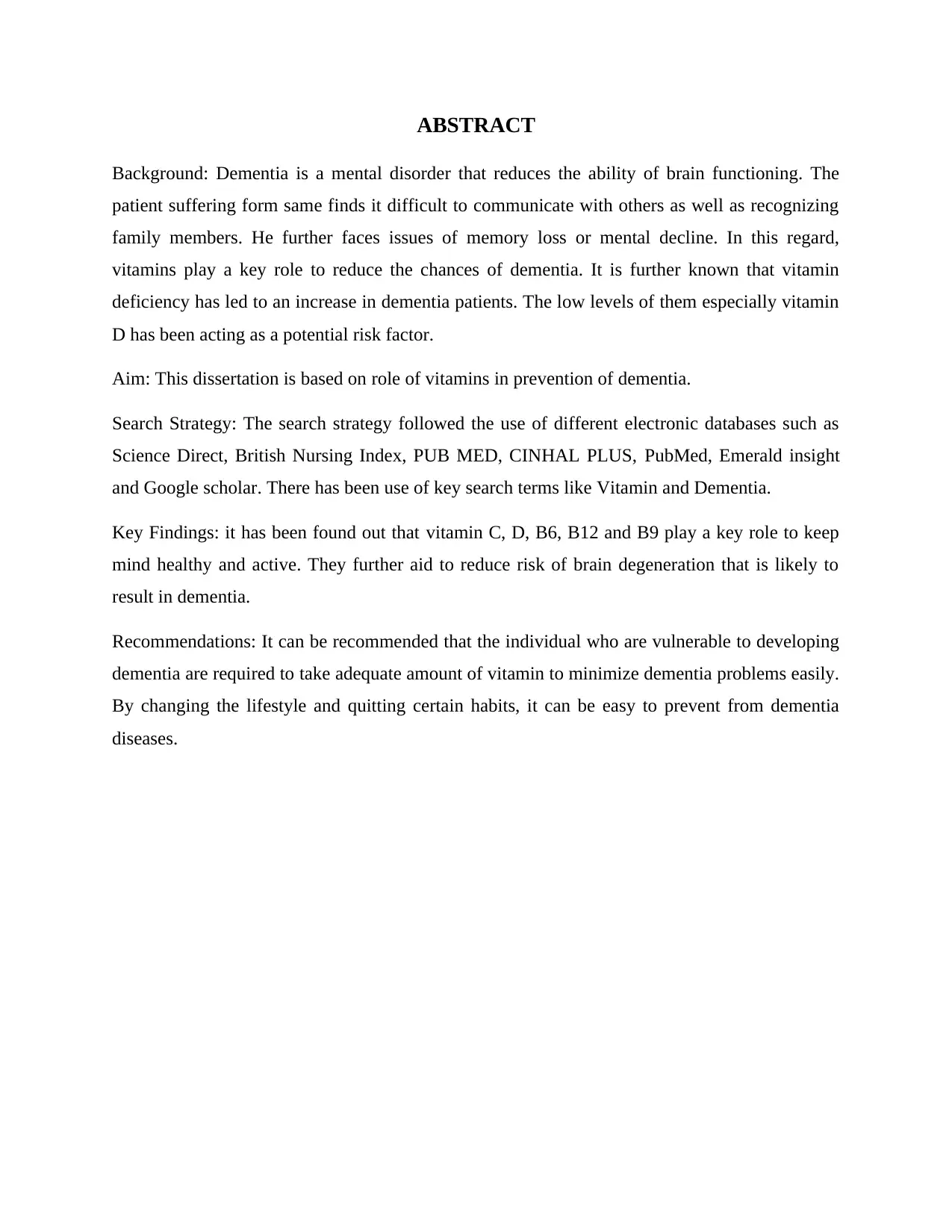
ABSTRACT
Background: Dementia is a mental disorder that reduces the ability of brain functioning. The
patient suffering form same finds it difficult to communicate with others as well as recognizing
family members. He further faces issues of memory loss or mental decline. In this regard,
vitamins play a key role to reduce the chances of dementia. It is further known that vitamin
deficiency has led to an increase in dementia patients. The low levels of them especially vitamin
D has been acting as a potential risk factor.
Aim: This dissertation is based on role of vitamins in prevention of dementia.
Search Strategy: The search strategy followed the use of different electronic databases such as
Science Direct, British Nursing Index, PUB MED, CINHAL PLUS, PubMed, Emerald insight
and Google scholar. There has been use of key search terms like Vitamin and Dementia.
Key Findings: it has been found out that vitamin C, D, B6, B12 and B9 play a key role to keep
mind healthy and active. They further aid to reduce risk of brain degeneration that is likely to
result in dementia.
Recommendations: It can be recommended that the individual who are vulnerable to developing
dementia are required to take adequate amount of vitamin to minimize dementia problems easily.
By changing the lifestyle and quitting certain habits, it can be easy to prevent from dementia
diseases.
Background: Dementia is a mental disorder that reduces the ability of brain functioning. The
patient suffering form same finds it difficult to communicate with others as well as recognizing
family members. He further faces issues of memory loss or mental decline. In this regard,
vitamins play a key role to reduce the chances of dementia. It is further known that vitamin
deficiency has led to an increase in dementia patients. The low levels of them especially vitamin
D has been acting as a potential risk factor.
Aim: This dissertation is based on role of vitamins in prevention of dementia.
Search Strategy: The search strategy followed the use of different electronic databases such as
Science Direct, British Nursing Index, PUB MED, CINHAL PLUS, PubMed, Emerald insight
and Google scholar. There has been use of key search terms like Vitamin and Dementia.
Key Findings: it has been found out that vitamin C, D, B6, B12 and B9 play a key role to keep
mind healthy and active. They further aid to reduce risk of brain degeneration that is likely to
result in dementia.
Recommendations: It can be recommended that the individual who are vulnerable to developing
dementia are required to take adequate amount of vitamin to minimize dementia problems easily.
By changing the lifestyle and quitting certain habits, it can be easy to prevent from dementia
diseases.
⊘ This is a preview!⊘
Do you want full access?
Subscribe today to unlock all pages.

Trusted by 1+ million students worldwide
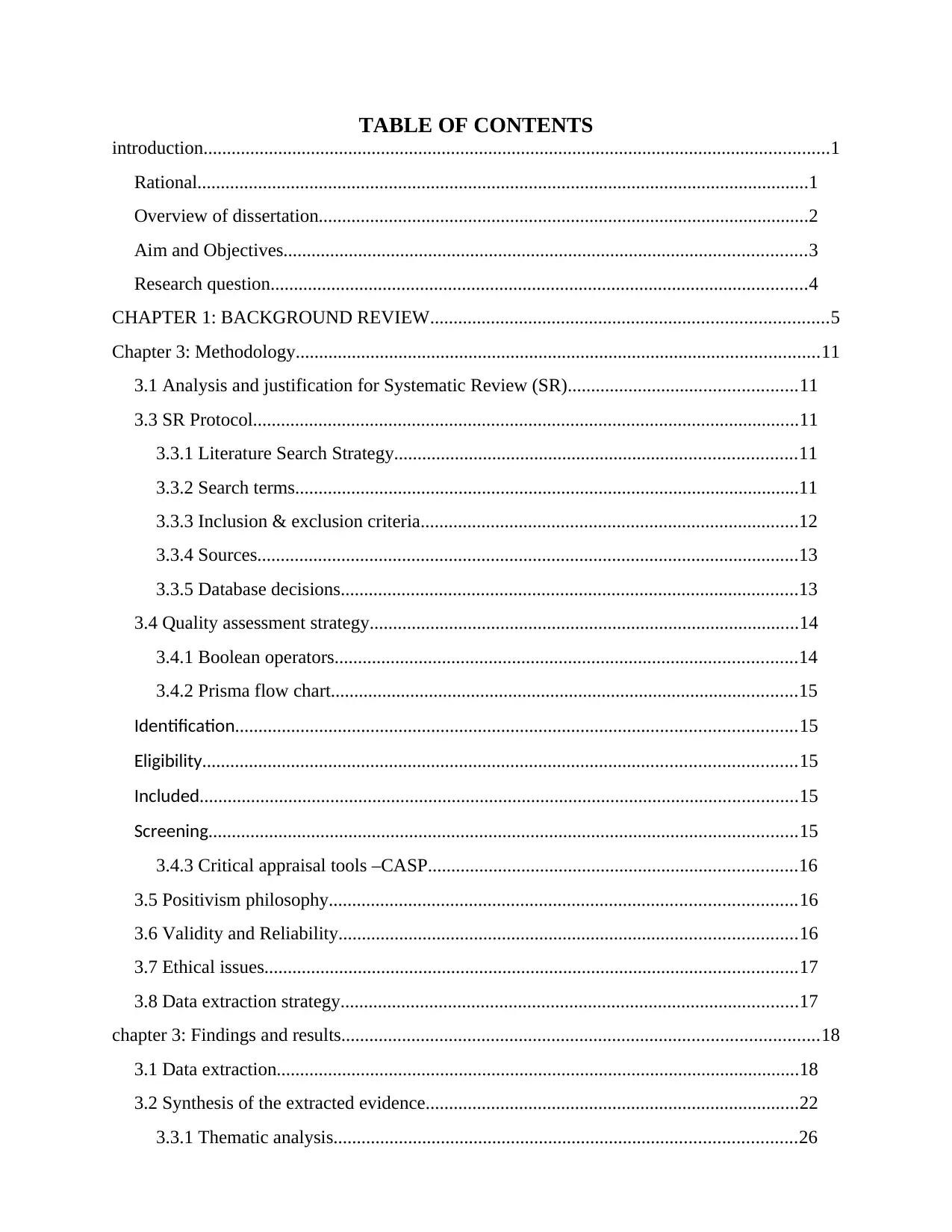
TABLE OF CONTENTS
introduction......................................................................................................................................1
Rational...................................................................................................................................1
Overview of dissertation.........................................................................................................2
Aim and Objectives................................................................................................................3
Research question...................................................................................................................4
CHAPTER 1: BACKGROUND REVIEW.....................................................................................5
Chapter 3: Methodology................................................................................................................11
3.1 Analysis and justification for Systematic Review (SR).................................................11
3.3 SR Protocol.....................................................................................................................11
3.3.1 Literature Search Strategy......................................................................................11
3.3.2 Search terms............................................................................................................11
3.3.3 Inclusion & exclusion criteria.................................................................................12
3.3.4 Sources....................................................................................................................13
3.3.5 Database decisions..................................................................................................13
3.4 Quality assessment strategy............................................................................................14
3.4.1 Boolean operators...................................................................................................14
3.4.2 Prisma flow chart....................................................................................................15
Identification........................................................................................................................15
Eligibility...............................................................................................................................15
Included................................................................................................................................15
Screening..............................................................................................................................15
3.4.3 Critical appraisal tools –CASP...............................................................................16
3.5 Positivism philosophy....................................................................................................16
3.6 Validity and Reliability..................................................................................................16
3.7 Ethical issues..................................................................................................................17
3.8 Data extraction strategy..................................................................................................17
chapter 3: Findings and results......................................................................................................18
3.1 Data extraction................................................................................................................18
3.2 Synthesis of the extracted evidence................................................................................22
3.3.1 Thematic analysis...................................................................................................26
introduction......................................................................................................................................1
Rational...................................................................................................................................1
Overview of dissertation.........................................................................................................2
Aim and Objectives................................................................................................................3
Research question...................................................................................................................4
CHAPTER 1: BACKGROUND REVIEW.....................................................................................5
Chapter 3: Methodology................................................................................................................11
3.1 Analysis and justification for Systematic Review (SR).................................................11
3.3 SR Protocol.....................................................................................................................11
3.3.1 Literature Search Strategy......................................................................................11
3.3.2 Search terms............................................................................................................11
3.3.3 Inclusion & exclusion criteria.................................................................................12
3.3.4 Sources....................................................................................................................13
3.3.5 Database decisions..................................................................................................13
3.4 Quality assessment strategy............................................................................................14
3.4.1 Boolean operators...................................................................................................14
3.4.2 Prisma flow chart....................................................................................................15
Identification........................................................................................................................15
Eligibility...............................................................................................................................15
Included................................................................................................................................15
Screening..............................................................................................................................15
3.4.3 Critical appraisal tools –CASP...............................................................................16
3.5 Positivism philosophy....................................................................................................16
3.6 Validity and Reliability..................................................................................................16
3.7 Ethical issues..................................................................................................................17
3.8 Data extraction strategy..................................................................................................17
chapter 3: Findings and results......................................................................................................18
3.1 Data extraction................................................................................................................18
3.2 Synthesis of the extracted evidence................................................................................22
3.3.1 Thematic analysis...................................................................................................26
Paraphrase This Document
Need a fresh take? Get an instant paraphrase of this document with our AI Paraphraser
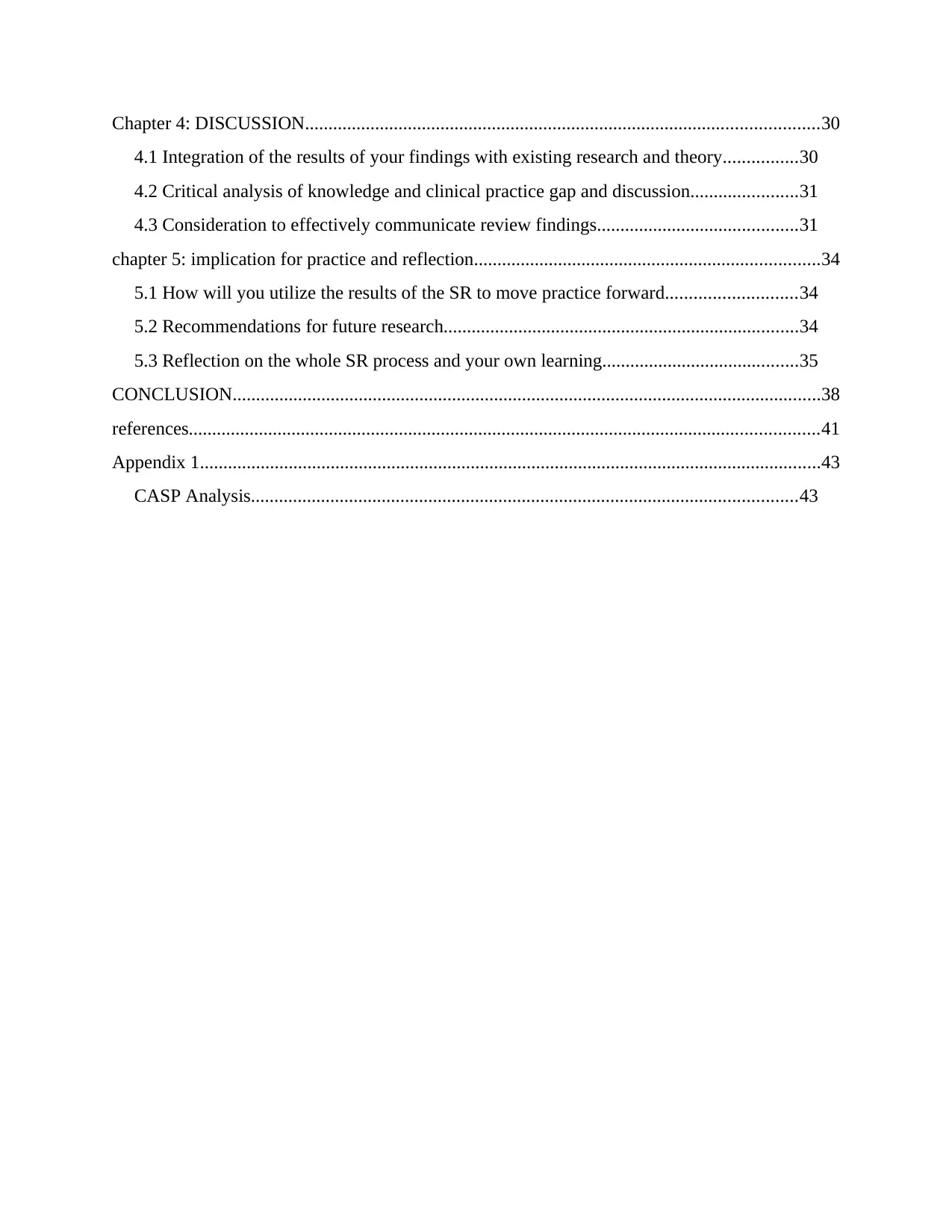
Chapter 4: DISCUSSION..............................................................................................................30
4.1 Integration of the results of your findings with existing research and theory................30
4.2 Critical analysis of knowledge and clinical practice gap and discussion.......................31
4.3 Consideration to effectively communicate review findings...........................................31
chapter 5: implication for practice and reflection..........................................................................34
5.1 How will you utilize the results of the SR to move practice forward............................34
5.2 Recommendations for future research............................................................................34
5.3 Reflection on the whole SR process and your own learning..........................................35
CONCLUSION..............................................................................................................................38
references.......................................................................................................................................41
Appendix 1.....................................................................................................................................43
CASP Analysis.....................................................................................................................43
4.1 Integration of the results of your findings with existing research and theory................30
4.2 Critical analysis of knowledge and clinical practice gap and discussion.......................31
4.3 Consideration to effectively communicate review findings...........................................31
chapter 5: implication for practice and reflection..........................................................................34
5.1 How will you utilize the results of the SR to move practice forward............................34
5.2 Recommendations for future research............................................................................34
5.3 Reflection on the whole SR process and your own learning..........................................35
CONCLUSION..............................................................................................................................38
references.......................................................................................................................................41
Appendix 1.....................................................................................................................................43
CASP Analysis.....................................................................................................................43
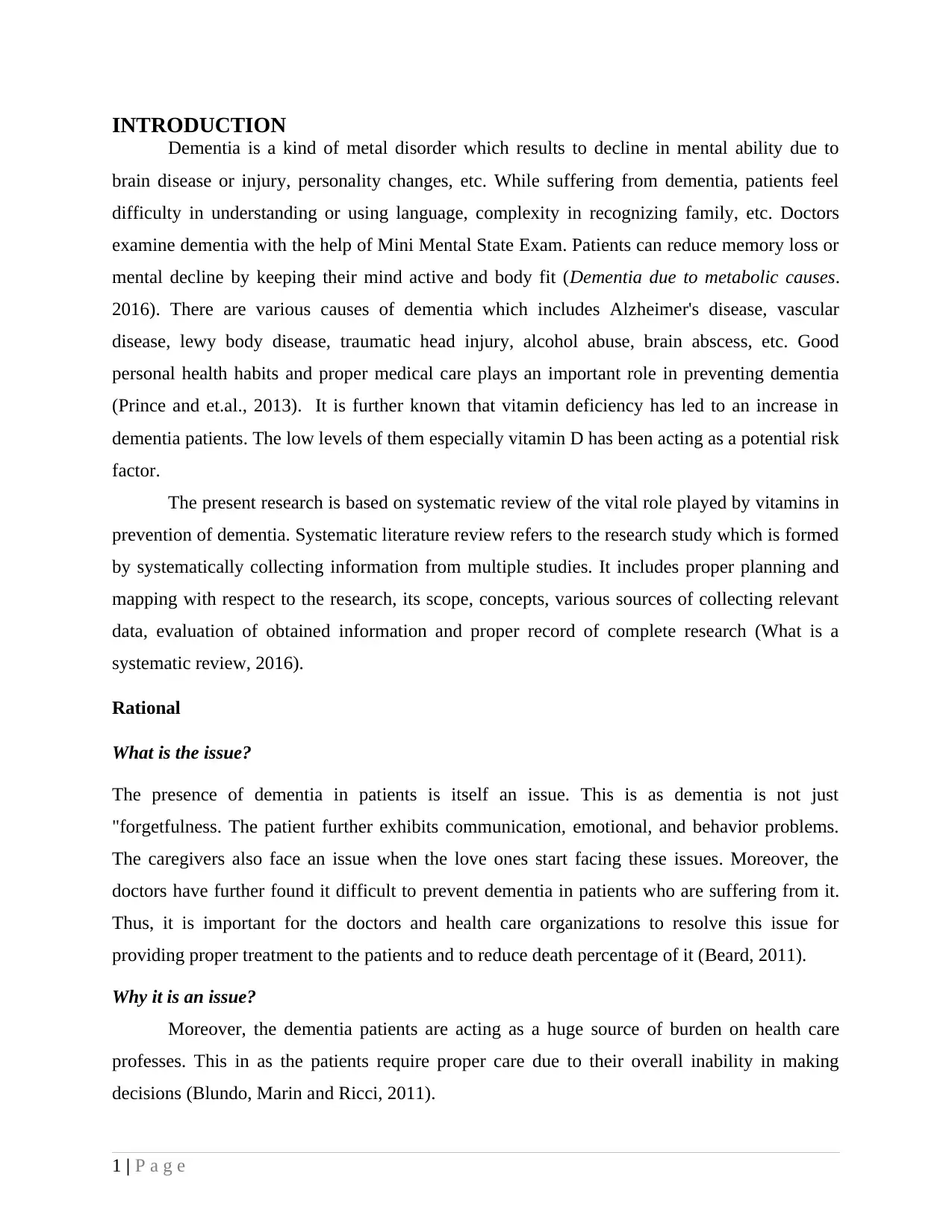
INTRODUCTION
Dementia is a kind of metal disorder which results to decline in mental ability due to
brain disease or injury, personality changes, etc. While suffering from dementia, patients feel
difficulty in understanding or using language, complexity in recognizing family, etc. Doctors
examine dementia with the help of Mini Mental State Exam. Patients can reduce memory loss or
mental decline by keeping their mind active and body fit (Dementia due to metabolic causes.
2016). There are various causes of dementia which includes Alzheimer's disease, vascular
disease, lewy body disease, traumatic head injury, alcohol abuse, brain abscess, etc. Good
personal health habits and proper medical care plays an important role in preventing dementia
(Prince and et.al., 2013). It is further known that vitamin deficiency has led to an increase in
dementia patients. The low levels of them especially vitamin D has been acting as a potential risk
factor.
The present research is based on systematic review of the vital role played by vitamins in
prevention of dementia. Systematic literature review refers to the research study which is formed
by systematically collecting information from multiple studies. It includes proper planning and
mapping with respect to the research, its scope, concepts, various sources of collecting relevant
data, evaluation of obtained information and proper record of complete research (What is a
systematic review, 2016).
Rational
What is the issue?
The presence of dementia in patients is itself an issue. This is as dementia is not just
"forgetfulness. The patient further exhibits communication, emotional, and behavior problems.
The caregivers also face an issue when the love ones start facing these issues. Moreover, the
doctors have further found it difficult to prevent dementia in patients who are suffering from it.
Thus, it is important for the doctors and health care organizations to resolve this issue for
providing proper treatment to the patients and to reduce death percentage of it (Beard, 2011).
Why it is an issue?
Moreover, the dementia patients are acting as a huge source of burden on health care
professes. This in as the patients require proper care due to their overall inability in making
decisions (Blundo, Marin and Ricci, 2011).
1 | P a g e
Dementia is a kind of metal disorder which results to decline in mental ability due to
brain disease or injury, personality changes, etc. While suffering from dementia, patients feel
difficulty in understanding or using language, complexity in recognizing family, etc. Doctors
examine dementia with the help of Mini Mental State Exam. Patients can reduce memory loss or
mental decline by keeping their mind active and body fit (Dementia due to metabolic causes.
2016). There are various causes of dementia which includes Alzheimer's disease, vascular
disease, lewy body disease, traumatic head injury, alcohol abuse, brain abscess, etc. Good
personal health habits and proper medical care plays an important role in preventing dementia
(Prince and et.al., 2013). It is further known that vitamin deficiency has led to an increase in
dementia patients. The low levels of them especially vitamin D has been acting as a potential risk
factor.
The present research is based on systematic review of the vital role played by vitamins in
prevention of dementia. Systematic literature review refers to the research study which is formed
by systematically collecting information from multiple studies. It includes proper planning and
mapping with respect to the research, its scope, concepts, various sources of collecting relevant
data, evaluation of obtained information and proper record of complete research (What is a
systematic review, 2016).
Rational
What is the issue?
The presence of dementia in patients is itself an issue. This is as dementia is not just
"forgetfulness. The patient further exhibits communication, emotional, and behavior problems.
The caregivers also face an issue when the love ones start facing these issues. Moreover, the
doctors have further found it difficult to prevent dementia in patients who are suffering from it.
Thus, it is important for the doctors and health care organizations to resolve this issue for
providing proper treatment to the patients and to reduce death percentage of it (Beard, 2011).
Why it is an issue?
Moreover, the dementia patients are acting as a huge source of burden on health care
professes. This in as the patients require proper care due to their overall inability in making
decisions (Blundo, Marin and Ricci, 2011).
1 | P a g e
⊘ This is a preview!⊘
Do you want full access?
Subscribe today to unlock all pages.

Trusted by 1+ million students worldwide
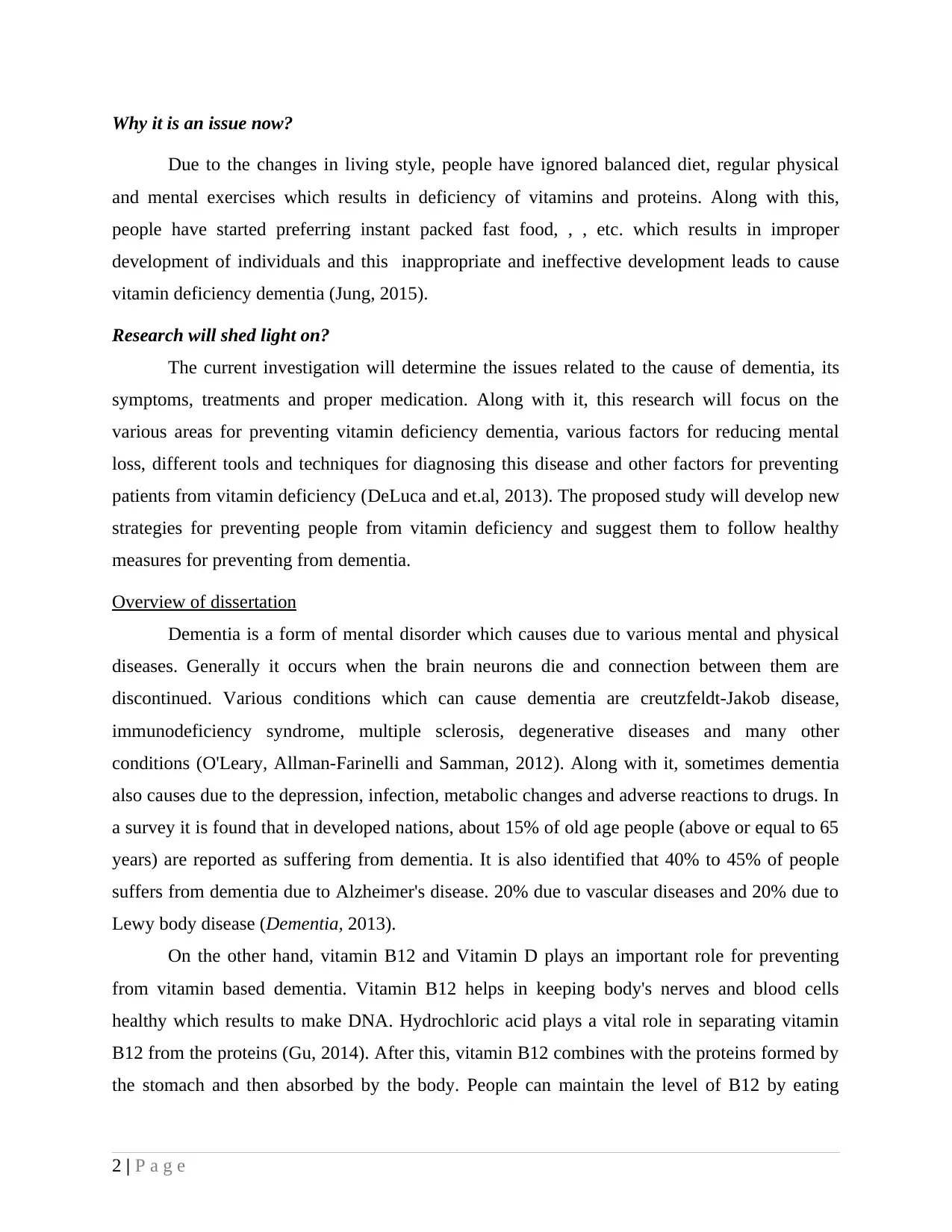
Why it is an issue now?
Due to the changes in living style, people have ignored balanced diet, regular physical
and mental exercises which results in deficiency of vitamins and proteins. Along with this,
people have started preferring instant packed fast food, , , etc. which results in improper
development of individuals and this inappropriate and ineffective development leads to cause
vitamin deficiency dementia (Jung, 2015).
Research will shed light on?
The current investigation will determine the issues related to the cause of dementia, its
symptoms, treatments and proper medication. Along with it, this research will focus on the
various areas for preventing vitamin deficiency dementia, various factors for reducing mental
loss, different tools and techniques for diagnosing this disease and other factors for preventing
patients from vitamin deficiency (DeLuca and et.al, 2013). The proposed study will develop new
strategies for preventing people from vitamin deficiency and suggest them to follow healthy
measures for preventing from dementia.
Overview of dissertation
Dementia is a form of mental disorder which causes due to various mental and physical
diseases. Generally it occurs when the brain neurons die and connection between them are
discontinued. Various conditions which can cause dementia are creutzfeldt-Jakob disease,
immunodeficiency syndrome, multiple sclerosis, degenerative diseases and many other
conditions (O'Leary, Allman-Farinelli and Samman, 2012). Along with it, sometimes dementia
also causes due to the depression, infection, metabolic changes and adverse reactions to drugs. In
a survey it is found that in developed nations, about 15% of old age people (above or equal to 65
years) are reported as suffering from dementia. It is also identified that 40% to 45% of people
suffers from dementia due to Alzheimer's disease. 20% due to vascular diseases and 20% due to
Lewy body disease (Dementia, 2013).
On the other hand, vitamin B12 and Vitamin D plays an important role for preventing
from vitamin based dementia. Vitamin B12 helps in keeping body's nerves and blood cells
healthy which results to make DNA. Hydrochloric acid plays a vital role in separating vitamin
B12 from the proteins (Gu, 2014). After this, vitamin B12 combines with the proteins formed by
the stomach and then absorbed by the body. People can maintain the level of B12 by eating
2 | P a g e
Due to the changes in living style, people have ignored balanced diet, regular physical
and mental exercises which results in deficiency of vitamins and proteins. Along with this,
people have started preferring instant packed fast food, , , etc. which results in improper
development of individuals and this inappropriate and ineffective development leads to cause
vitamin deficiency dementia (Jung, 2015).
Research will shed light on?
The current investigation will determine the issues related to the cause of dementia, its
symptoms, treatments and proper medication. Along with it, this research will focus on the
various areas for preventing vitamin deficiency dementia, various factors for reducing mental
loss, different tools and techniques for diagnosing this disease and other factors for preventing
patients from vitamin deficiency (DeLuca and et.al, 2013). The proposed study will develop new
strategies for preventing people from vitamin deficiency and suggest them to follow healthy
measures for preventing from dementia.
Overview of dissertation
Dementia is a form of mental disorder which causes due to various mental and physical
diseases. Generally it occurs when the brain neurons die and connection between them are
discontinued. Various conditions which can cause dementia are creutzfeldt-Jakob disease,
immunodeficiency syndrome, multiple sclerosis, degenerative diseases and many other
conditions (O'Leary, Allman-Farinelli and Samman, 2012). Along with it, sometimes dementia
also causes due to the depression, infection, metabolic changes and adverse reactions to drugs. In
a survey it is found that in developed nations, about 15% of old age people (above or equal to 65
years) are reported as suffering from dementia. It is also identified that 40% to 45% of people
suffers from dementia due to Alzheimer's disease. 20% due to vascular diseases and 20% due to
Lewy body disease (Dementia, 2013).
On the other hand, vitamin B12 and Vitamin D plays an important role for preventing
from vitamin based dementia. Vitamin B12 helps in keeping body's nerves and blood cells
healthy which results to make DNA. Hydrochloric acid plays a vital role in separating vitamin
B12 from the proteins (Gu, 2014). After this, vitamin B12 combines with the proteins formed by
the stomach and then absorbed by the body. People can maintain the level of B12 by eating
2 | P a g e
Paraphrase This Document
Need a fresh take? Get an instant paraphrase of this document with our AI Paraphraser
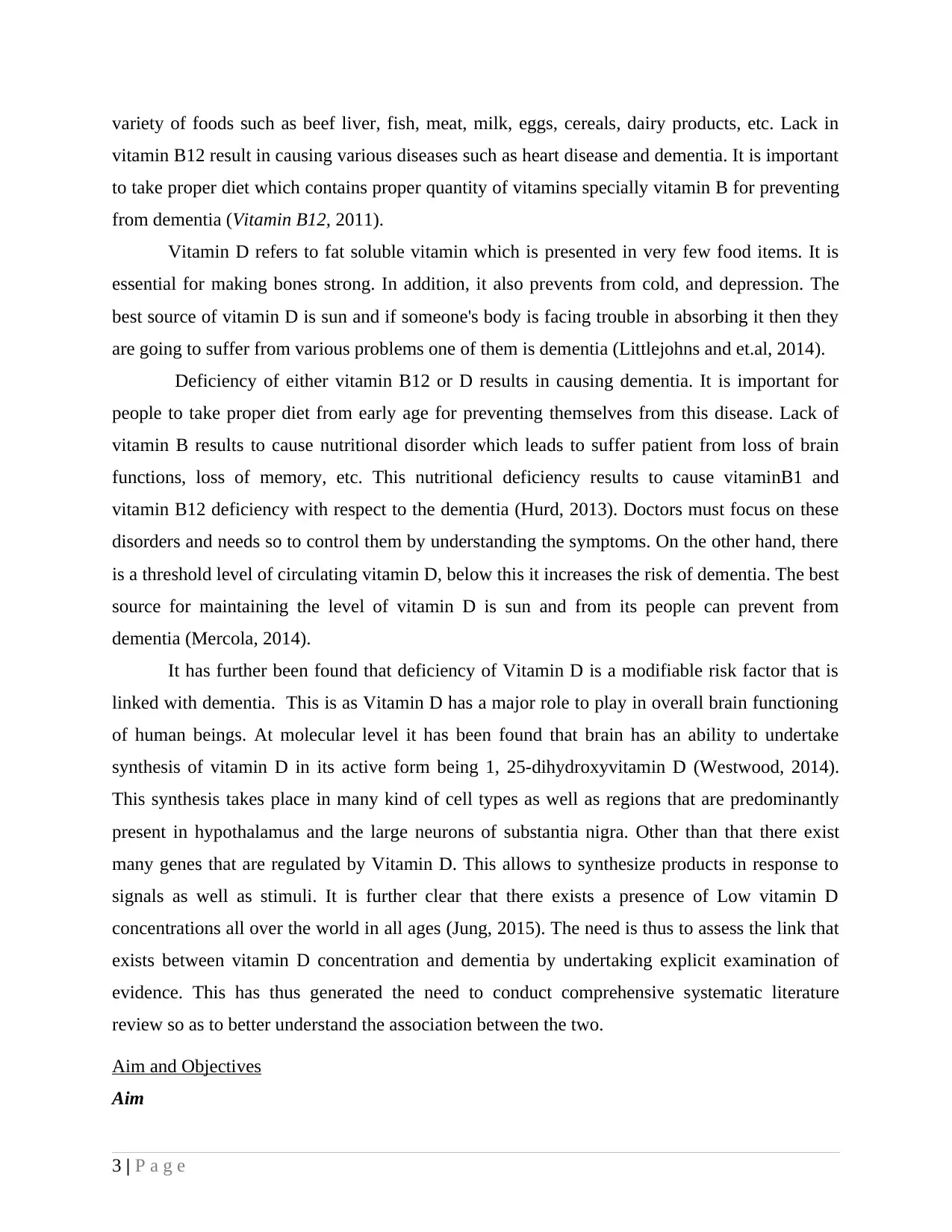
variety of foods such as beef liver, fish, meat, milk, eggs, cereals, dairy products, etc. Lack in
vitamin B12 result in causing various diseases such as heart disease and dementia. It is important
to take proper diet which contains proper quantity of vitamins specially vitamin B for preventing
from dementia (Vitamin B12, 2011).
Vitamin D refers to fat soluble vitamin which is presented in very few food items. It is
essential for making bones strong. In addition, it also prevents from cold, and depression. The
best source of vitamin D is sun and if someone's body is facing trouble in absorbing it then they
are going to suffer from various problems one of them is dementia (Littlejohns and et.al, 2014).
Deficiency of either vitamin B12 or D results in causing dementia. It is important for
people to take proper diet from early age for preventing themselves from this disease. Lack of
vitamin B results to cause nutritional disorder which leads to suffer patient from loss of brain
functions, loss of memory, etc. This nutritional deficiency results to cause vitaminB1 and
vitamin B12 deficiency with respect to the dementia (Hurd, 2013). Doctors must focus on these
disorders and needs so to control them by understanding the symptoms. On the other hand, there
is a threshold level of circulating vitamin D, below this it increases the risk of dementia. The best
source for maintaining the level of vitamin D is sun and from its people can prevent from
dementia (Mercola, 2014).
It has further been found that deficiency of Vitamin D is a modifiable risk factor that is
linked with dementia. This is as Vitamin D has a major role to play in overall brain functioning
of human beings. At molecular level it has been found that brain has an ability to undertake
synthesis of vitamin D in its active form being 1, 25-dihydroxyvitamin D (Westwood, 2014).
This synthesis takes place in many kind of cell types as well as regions that are predominantly
present in hypothalamus and the large neurons of substantia nigra. Other than that there exist
many genes that are regulated by Vitamin D. This allows to synthesize products in response to
signals as well as stimuli. It is further clear that there exists a presence of Low vitamin D
concentrations all over the world in all ages (Jung, 2015). The need is thus to assess the link that
exists between vitamin D concentration and dementia by undertaking explicit examination of
evidence. This has thus generated the need to conduct comprehensive systematic literature
review so as to better understand the association between the two.
Aim and Objectives
Aim
3 | P a g e
vitamin B12 result in causing various diseases such as heart disease and dementia. It is important
to take proper diet which contains proper quantity of vitamins specially vitamin B for preventing
from dementia (Vitamin B12, 2011).
Vitamin D refers to fat soluble vitamin which is presented in very few food items. It is
essential for making bones strong. In addition, it also prevents from cold, and depression. The
best source of vitamin D is sun and if someone's body is facing trouble in absorbing it then they
are going to suffer from various problems one of them is dementia (Littlejohns and et.al, 2014).
Deficiency of either vitamin B12 or D results in causing dementia. It is important for
people to take proper diet from early age for preventing themselves from this disease. Lack of
vitamin B results to cause nutritional disorder which leads to suffer patient from loss of brain
functions, loss of memory, etc. This nutritional deficiency results to cause vitaminB1 and
vitamin B12 deficiency with respect to the dementia (Hurd, 2013). Doctors must focus on these
disorders and needs so to control them by understanding the symptoms. On the other hand, there
is a threshold level of circulating vitamin D, below this it increases the risk of dementia. The best
source for maintaining the level of vitamin D is sun and from its people can prevent from
dementia (Mercola, 2014).
It has further been found that deficiency of Vitamin D is a modifiable risk factor that is
linked with dementia. This is as Vitamin D has a major role to play in overall brain functioning
of human beings. At molecular level it has been found that brain has an ability to undertake
synthesis of vitamin D in its active form being 1, 25-dihydroxyvitamin D (Westwood, 2014).
This synthesis takes place in many kind of cell types as well as regions that are predominantly
present in hypothalamus and the large neurons of substantia nigra. Other than that there exist
many genes that are regulated by Vitamin D. This allows to synthesize products in response to
signals as well as stimuli. It is further clear that there exists a presence of Low vitamin D
concentrations all over the world in all ages (Jung, 2015). The need is thus to assess the link that
exists between vitamin D concentration and dementia by undertaking explicit examination of
evidence. This has thus generated the need to conduct comprehensive systematic literature
review so as to better understand the association between the two.
Aim and Objectives
Aim
3 | P a g e
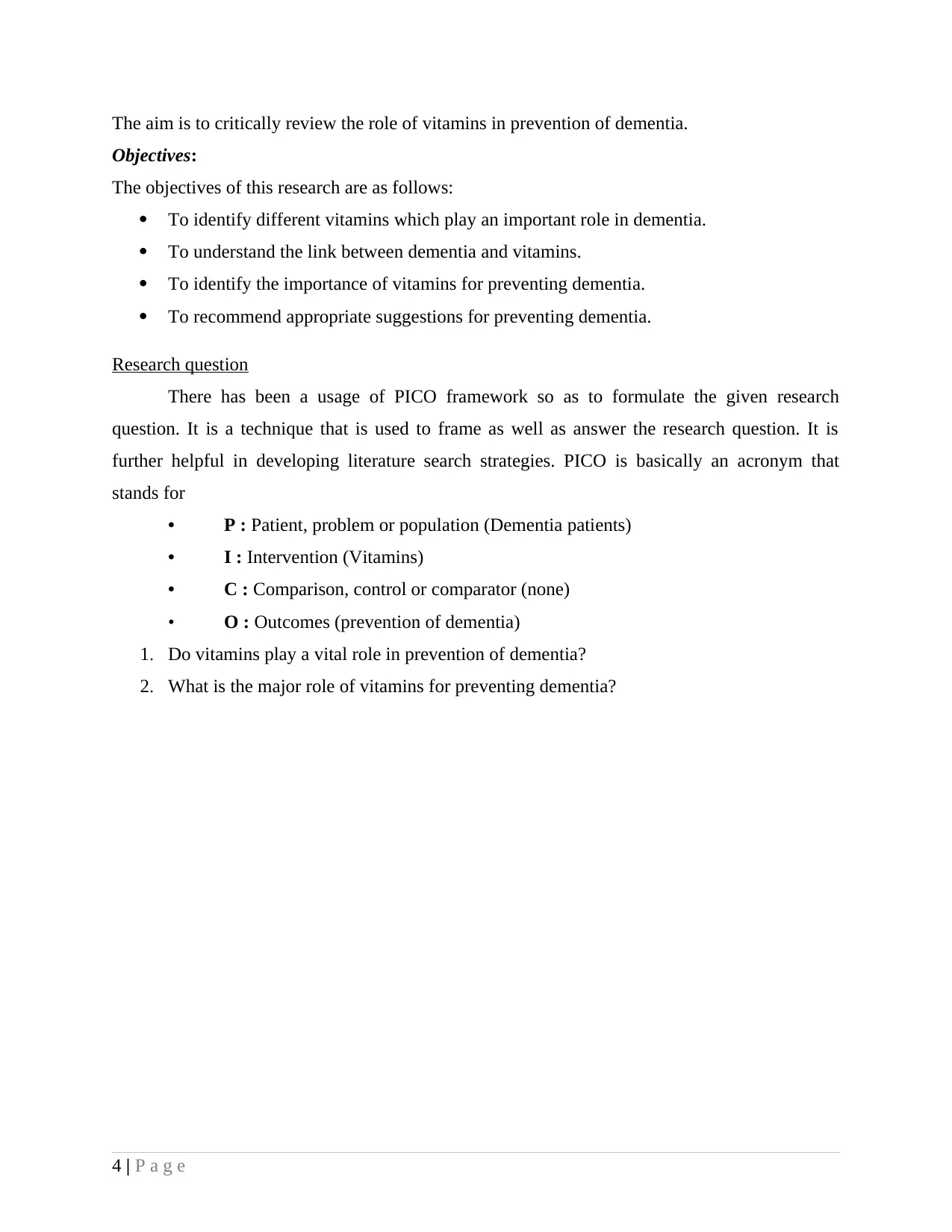
The aim is to critically review the role of vitamins in prevention of dementia.
Objectives:
The objectives of this research are as follows:
To identify different vitamins which play an important role in dementia.
To understand the link between dementia and vitamins.
To identify the importance of vitamins for preventing dementia.
To recommend appropriate suggestions for preventing dementia.
Research question
There has been a usage of PICO framework so as to formulate the given research
question. It is a technique that is used to frame as well as answer the research question. It is
further helpful in developing literature search strategies. PICO is basically an acronym that
stands for
• P : Patient, problem or population (Dementia patients)
• I : Intervention (Vitamins)
• C : Comparison, control or comparator (none)
• O : Outcomes (prevention of dementia)
1. Do vitamins play a vital role in prevention of dementia?
2. What is the major role of vitamins for preventing dementia?
4 | P a g e
Objectives:
The objectives of this research are as follows:
To identify different vitamins which play an important role in dementia.
To understand the link between dementia and vitamins.
To identify the importance of vitamins for preventing dementia.
To recommend appropriate suggestions for preventing dementia.
Research question
There has been a usage of PICO framework so as to formulate the given research
question. It is a technique that is used to frame as well as answer the research question. It is
further helpful in developing literature search strategies. PICO is basically an acronym that
stands for
• P : Patient, problem or population (Dementia patients)
• I : Intervention (Vitamins)
• C : Comparison, control or comparator (none)
• O : Outcomes (prevention of dementia)
1. Do vitamins play a vital role in prevention of dementia?
2. What is the major role of vitamins for preventing dementia?
4 | P a g e
⊘ This is a preview!⊘
Do you want full access?
Subscribe today to unlock all pages.

Trusted by 1+ million students worldwide
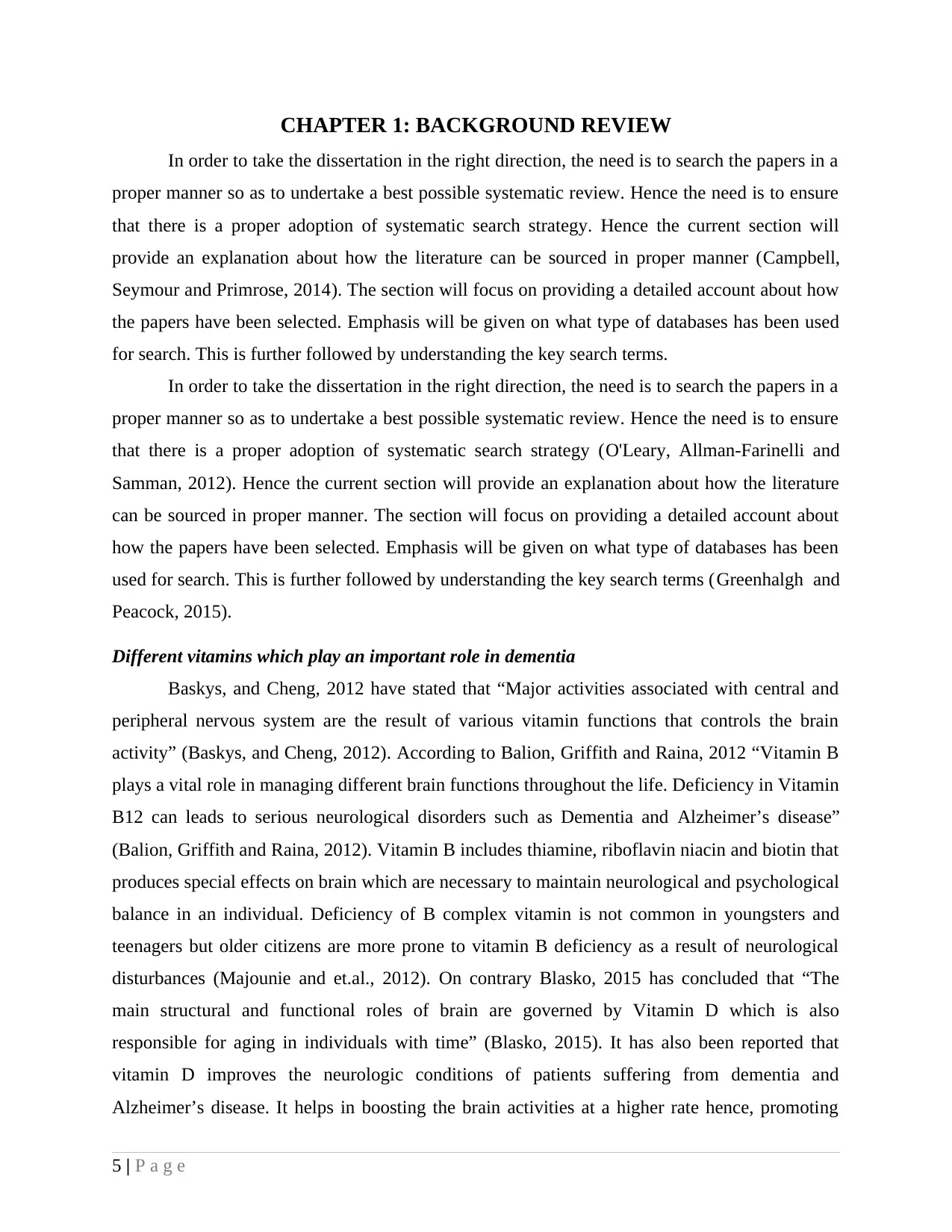
CHAPTER 1: BACKGROUND REVIEW
In order to take the dissertation in the right direction, the need is to search the papers in a
proper manner so as to undertake a best possible systematic review. Hence the need is to ensure
that there is a proper adoption of systematic search strategy. Hence the current section will
provide an explanation about how the literature can be sourced in proper manner (Campbell,
Seymour and Primrose, 2014). The section will focus on providing a detailed account about how
the papers have been selected. Emphasis will be given on what type of databases has been used
for search. This is further followed by understanding the key search terms.
In order to take the dissertation in the right direction, the need is to search the papers in a
proper manner so as to undertake a best possible systematic review. Hence the need is to ensure
that there is a proper adoption of systematic search strategy (O'Leary, Allman-Farinelli and
Samman, 2012). Hence the current section will provide an explanation about how the literature
can be sourced in proper manner. The section will focus on providing a detailed account about
how the papers have been selected. Emphasis will be given on what type of databases has been
used for search. This is further followed by understanding the key search terms (Greenhalgh and
Peacock, 2015).
Different vitamins which play an important role in dementia
Baskys, and Cheng, 2012 have stated that “Major activities associated with central and
peripheral nervous system are the result of various vitamin functions that controls the brain
activity” (Baskys, and Cheng, 2012). According to Balion, Griffith and Raina, 2012 “Vitamin B
plays a vital role in managing different brain functions throughout the life. Deficiency in Vitamin
B12 can leads to serious neurological disorders such as Dementia and Alzheimer’s disease”
(Balion, Griffith and Raina, 2012). Vitamin B includes thiamine, riboflavin niacin and biotin that
produces special effects on brain which are necessary to maintain neurological and psychological
balance in an individual. Deficiency of B complex vitamin is not common in youngsters and
teenagers but older citizens are more prone to vitamin B deficiency as a result of neurological
disturbances (Majounie and et.al., 2012). On contrary Blasko, 2015 has concluded that “The
main structural and functional roles of brain are governed by Vitamin D which is also
responsible for aging in individuals with time” (Blasko, 2015). It has also been reported that
vitamin D improves the neurologic conditions of patients suffering from dementia and
Alzheimer’s disease. It helps in boosting the brain activities at a higher rate hence, promoting
5 | P a g e
In order to take the dissertation in the right direction, the need is to search the papers in a
proper manner so as to undertake a best possible systematic review. Hence the need is to ensure
that there is a proper adoption of systematic search strategy. Hence the current section will
provide an explanation about how the literature can be sourced in proper manner (Campbell,
Seymour and Primrose, 2014). The section will focus on providing a detailed account about how
the papers have been selected. Emphasis will be given on what type of databases has been used
for search. This is further followed by understanding the key search terms.
In order to take the dissertation in the right direction, the need is to search the papers in a
proper manner so as to undertake a best possible systematic review. Hence the need is to ensure
that there is a proper adoption of systematic search strategy (O'Leary, Allman-Farinelli and
Samman, 2012). Hence the current section will provide an explanation about how the literature
can be sourced in proper manner. The section will focus on providing a detailed account about
how the papers have been selected. Emphasis will be given on what type of databases has been
used for search. This is further followed by understanding the key search terms (Greenhalgh and
Peacock, 2015).
Different vitamins which play an important role in dementia
Baskys, and Cheng, 2012 have stated that “Major activities associated with central and
peripheral nervous system are the result of various vitamin functions that controls the brain
activity” (Baskys, and Cheng, 2012). According to Balion, Griffith and Raina, 2012 “Vitamin B
plays a vital role in managing different brain functions throughout the life. Deficiency in Vitamin
B12 can leads to serious neurological disorders such as Dementia and Alzheimer’s disease”
(Balion, Griffith and Raina, 2012). Vitamin B includes thiamine, riboflavin niacin and biotin that
produces special effects on brain which are necessary to maintain neurological and psychological
balance in an individual. Deficiency of B complex vitamin is not common in youngsters and
teenagers but older citizens are more prone to vitamin B deficiency as a result of neurological
disturbances (Majounie and et.al., 2012). On contrary Blasko, 2015 has concluded that “The
main structural and functional roles of brain are governed by Vitamin D which is also
responsible for aging in individuals with time” (Blasko, 2015). It has also been reported that
vitamin D improves the neurologic conditions of patients suffering from dementia and
Alzheimer’s disease. It helps in boosting the brain activities at a higher rate hence, promoting
5 | P a g e
Paraphrase This Document
Need a fresh take? Get an instant paraphrase of this document with our AI Paraphraser
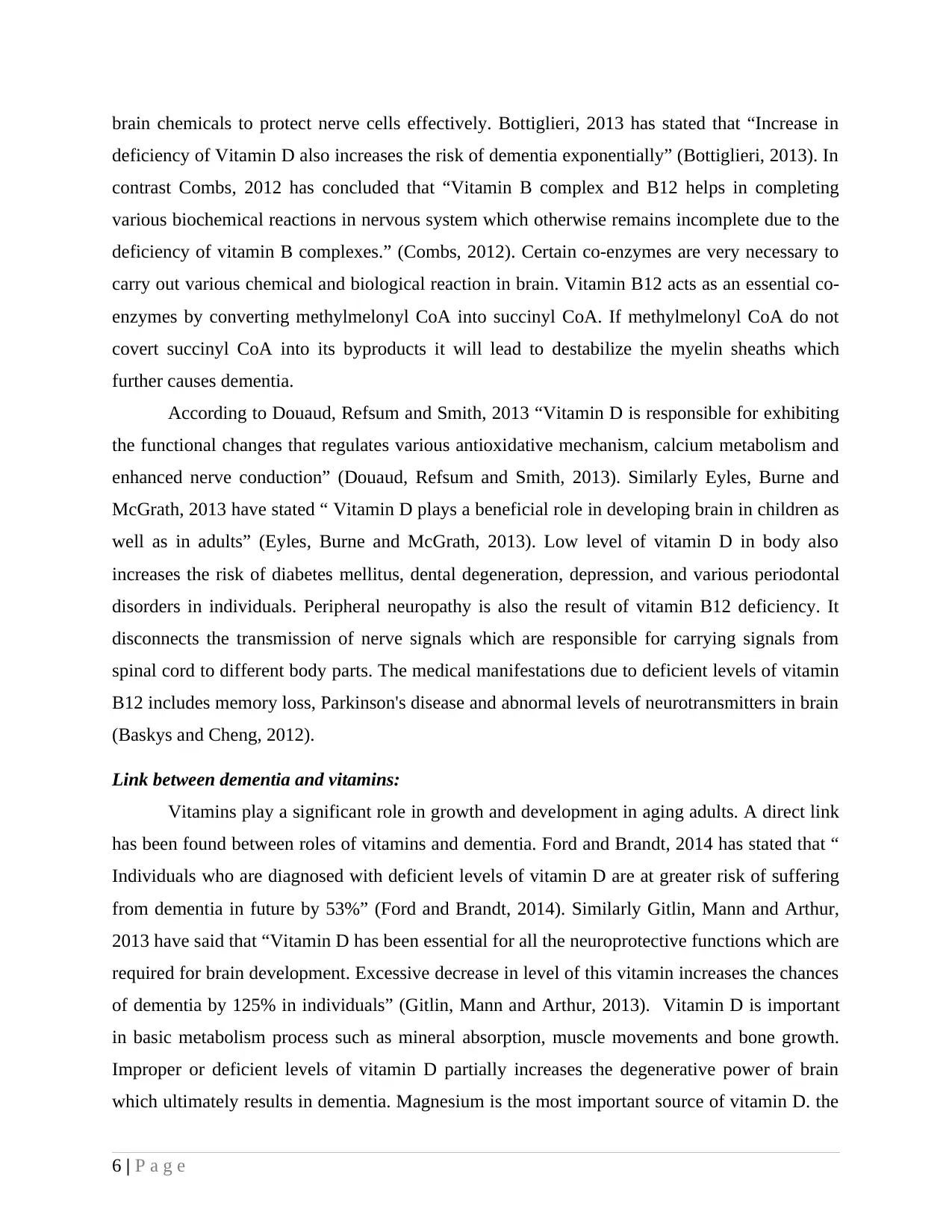
brain chemicals to protect nerve cells effectively. Bottiglieri, 2013 has stated that “Increase in
deficiency of Vitamin D also increases the risk of dementia exponentially” (Bottiglieri, 2013). In
contrast Combs, 2012 has concluded that “Vitamin B complex and B12 helps in completing
various biochemical reactions in nervous system which otherwise remains incomplete due to the
deficiency of vitamin B complexes.” (Combs, 2012). Certain co-enzymes are very necessary to
carry out various chemical and biological reaction in brain. Vitamin B12 acts as an essential co-
enzymes by converting methylmelonyl CoA into succinyl CoA. If methylmelonyl CoA do not
covert succinyl CoA into its byproducts it will lead to destabilize the myelin sheaths which
further causes dementia.
According to Douaud, Refsum and Smith, 2013 “Vitamin D is responsible for exhibiting
the functional changes that regulates various antioxidative mechanism, calcium metabolism and
enhanced nerve conduction” (Douaud, Refsum and Smith, 2013). Similarly Eyles, Burne and
McGrath, 2013 have stated “ Vitamin D plays a beneficial role in developing brain in children as
well as in adults” (Eyles, Burne and McGrath, 2013). Low level of vitamin D in body also
increases the risk of diabetes mellitus, dental degeneration, depression, and various periodontal
disorders in individuals. Peripheral neuropathy is also the result of vitamin B12 deficiency. It
disconnects the transmission of nerve signals which are responsible for carrying signals from
spinal cord to different body parts. The medical manifestations due to deficient levels of vitamin
B12 includes memory loss, Parkinson's disease and abnormal levels of neurotransmitters in brain
(Baskys and Cheng, 2012).
Link between dementia and vitamins:
Vitamins play a significant role in growth and development in aging adults. A direct link
has been found between roles of vitamins and dementia. Ford and Brandt, 2014 has stated that “
Individuals who are diagnosed with deficient levels of vitamin D are at greater risk of suffering
from dementia in future by 53%” (Ford and Brandt, 2014). Similarly Gitlin, Mann and Arthur,
2013 have said that “Vitamin D has been essential for all the neuroprotective functions which are
required for brain development. Excessive decrease in level of this vitamin increases the chances
of dementia by 125% in individuals” (Gitlin, Mann and Arthur, 2013). Vitamin D is important
in basic metabolism process such as mineral absorption, muscle movements and bone growth.
Improper or deficient levels of vitamin D partially increases the degenerative power of brain
which ultimately results in dementia. Magnesium is the most important source of vitamin D. the
6 | P a g e
deficiency of Vitamin D also increases the risk of dementia exponentially” (Bottiglieri, 2013). In
contrast Combs, 2012 has concluded that “Vitamin B complex and B12 helps in completing
various biochemical reactions in nervous system which otherwise remains incomplete due to the
deficiency of vitamin B complexes.” (Combs, 2012). Certain co-enzymes are very necessary to
carry out various chemical and biological reaction in brain. Vitamin B12 acts as an essential co-
enzymes by converting methylmelonyl CoA into succinyl CoA. If methylmelonyl CoA do not
covert succinyl CoA into its byproducts it will lead to destabilize the myelin sheaths which
further causes dementia.
According to Douaud, Refsum and Smith, 2013 “Vitamin D is responsible for exhibiting
the functional changes that regulates various antioxidative mechanism, calcium metabolism and
enhanced nerve conduction” (Douaud, Refsum and Smith, 2013). Similarly Eyles, Burne and
McGrath, 2013 have stated “ Vitamin D plays a beneficial role in developing brain in children as
well as in adults” (Eyles, Burne and McGrath, 2013). Low level of vitamin D in body also
increases the risk of diabetes mellitus, dental degeneration, depression, and various periodontal
disorders in individuals. Peripheral neuropathy is also the result of vitamin B12 deficiency. It
disconnects the transmission of nerve signals which are responsible for carrying signals from
spinal cord to different body parts. The medical manifestations due to deficient levels of vitamin
B12 includes memory loss, Parkinson's disease and abnormal levels of neurotransmitters in brain
(Baskys and Cheng, 2012).
Link between dementia and vitamins:
Vitamins play a significant role in growth and development in aging adults. A direct link
has been found between roles of vitamins and dementia. Ford and Brandt, 2014 has stated that “
Individuals who are diagnosed with deficient levels of vitamin D are at greater risk of suffering
from dementia in future by 53%” (Ford and Brandt, 2014). Similarly Gitlin, Mann and Arthur,
2013 have said that “Vitamin D has been essential for all the neuroprotective functions which are
required for brain development. Excessive decrease in level of this vitamin increases the chances
of dementia by 125% in individuals” (Gitlin, Mann and Arthur, 2013). Vitamin D is important
in basic metabolism process such as mineral absorption, muscle movements and bone growth.
Improper or deficient levels of vitamin D partially increases the degenerative power of brain
which ultimately results in dementia. Magnesium is the most important source of vitamin D. the
6 | P a g e
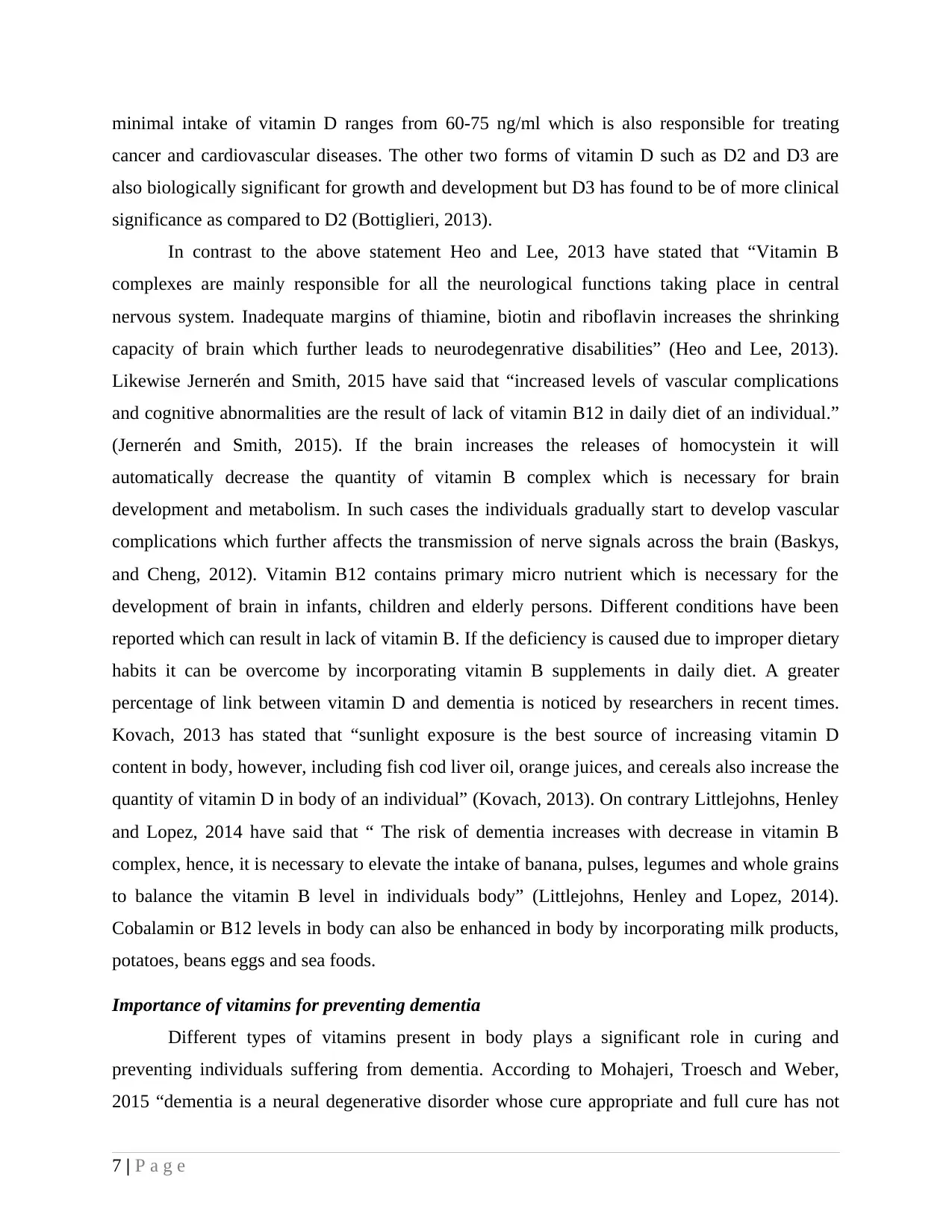
minimal intake of vitamin D ranges from 60-75 ng/ml which is also responsible for treating
cancer and cardiovascular diseases. The other two forms of vitamin D such as D2 and D3 are
also biologically significant for growth and development but D3 has found to be of more clinical
significance as compared to D2 (Bottiglieri, 2013).
In contrast to the above statement Heo and Lee, 2013 have stated that “Vitamin B
complexes are mainly responsible for all the neurological functions taking place in central
nervous system. Inadequate margins of thiamine, biotin and riboflavin increases the shrinking
capacity of brain which further leads to neurodegenrative disabilities” (Heo and Lee, 2013).
Likewise Jernerén and Smith, 2015 have said that “increased levels of vascular complications
and cognitive abnormalities are the result of lack of vitamin B12 in daily diet of an individual.”
(Jernerén and Smith, 2015). If the brain increases the releases of homocystein it will
automatically decrease the quantity of vitamin B complex which is necessary for brain
development and metabolism. In such cases the individuals gradually start to develop vascular
complications which further affects the transmission of nerve signals across the brain (Baskys,
and Cheng, 2012). Vitamin B12 contains primary micro nutrient which is necessary for the
development of brain in infants, children and elderly persons. Different conditions have been
reported which can result in lack of vitamin B. If the deficiency is caused due to improper dietary
habits it can be overcome by incorporating vitamin B supplements in daily diet. A greater
percentage of link between vitamin D and dementia is noticed by researchers in recent times.
Kovach, 2013 has stated that “sunlight exposure is the best source of increasing vitamin D
content in body, however, including fish cod liver oil, orange juices, and cereals also increase the
quantity of vitamin D in body of an individual” (Kovach, 2013). On contrary Littlejohns, Henley
and Lopez, 2014 have said that “ The risk of dementia increases with decrease in vitamin B
complex, hence, it is necessary to elevate the intake of banana, pulses, legumes and whole grains
to balance the vitamin B level in individuals body” (Littlejohns, Henley and Lopez, 2014).
Cobalamin or B12 levels in body can also be enhanced in body by incorporating milk products,
potatoes, beans eggs and sea foods.
Importance of vitamins for preventing dementia
Different types of vitamins present in body plays a significant role in curing and
preventing individuals suffering from dementia. According to Mohajeri, Troesch and Weber,
2015 “dementia is a neural degenerative disorder whose cure appropriate and full cure has not
7 | P a g e
cancer and cardiovascular diseases. The other two forms of vitamin D such as D2 and D3 are
also biologically significant for growth and development but D3 has found to be of more clinical
significance as compared to D2 (Bottiglieri, 2013).
In contrast to the above statement Heo and Lee, 2013 have stated that “Vitamin B
complexes are mainly responsible for all the neurological functions taking place in central
nervous system. Inadequate margins of thiamine, biotin and riboflavin increases the shrinking
capacity of brain which further leads to neurodegenrative disabilities” (Heo and Lee, 2013).
Likewise Jernerén and Smith, 2015 have said that “increased levels of vascular complications
and cognitive abnormalities are the result of lack of vitamin B12 in daily diet of an individual.”
(Jernerén and Smith, 2015). If the brain increases the releases of homocystein it will
automatically decrease the quantity of vitamin B complex which is necessary for brain
development and metabolism. In such cases the individuals gradually start to develop vascular
complications which further affects the transmission of nerve signals across the brain (Baskys,
and Cheng, 2012). Vitamin B12 contains primary micro nutrient which is necessary for the
development of brain in infants, children and elderly persons. Different conditions have been
reported which can result in lack of vitamin B. If the deficiency is caused due to improper dietary
habits it can be overcome by incorporating vitamin B supplements in daily diet. A greater
percentage of link between vitamin D and dementia is noticed by researchers in recent times.
Kovach, 2013 has stated that “sunlight exposure is the best source of increasing vitamin D
content in body, however, including fish cod liver oil, orange juices, and cereals also increase the
quantity of vitamin D in body of an individual” (Kovach, 2013). On contrary Littlejohns, Henley
and Lopez, 2014 have said that “ The risk of dementia increases with decrease in vitamin B
complex, hence, it is necessary to elevate the intake of banana, pulses, legumes and whole grains
to balance the vitamin B level in individuals body” (Littlejohns, Henley and Lopez, 2014).
Cobalamin or B12 levels in body can also be enhanced in body by incorporating milk products,
potatoes, beans eggs and sea foods.
Importance of vitamins for preventing dementia
Different types of vitamins present in body plays a significant role in curing and
preventing individuals suffering from dementia. According to Mohajeri, Troesch and Weber,
2015 “dementia is a neural degenerative disorder whose cure appropriate and full cure has not
7 | P a g e
⊘ This is a preview!⊘
Do you want full access?
Subscribe today to unlock all pages.

Trusted by 1+ million students worldwide
1 out of 65
Related Documents
Your All-in-One AI-Powered Toolkit for Academic Success.
+13062052269
info@desklib.com
Available 24*7 on WhatsApp / Email
![[object Object]](/_next/static/media/star-bottom.7253800d.svg)
Unlock your academic potential
Copyright © 2020–2026 A2Z Services. All Rights Reserved. Developed and managed by ZUCOL.





